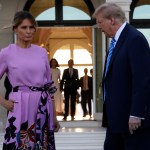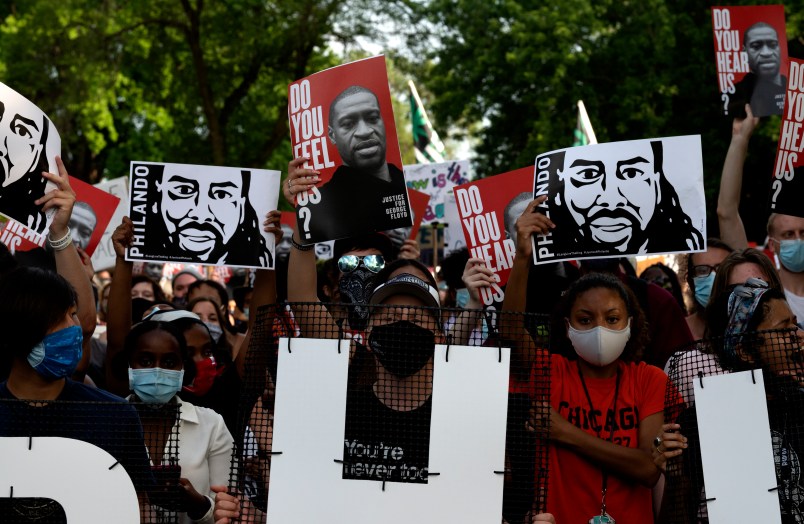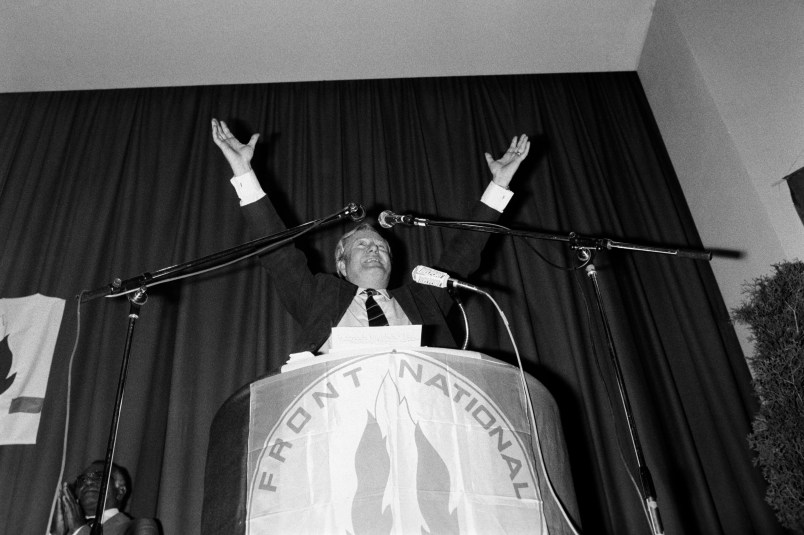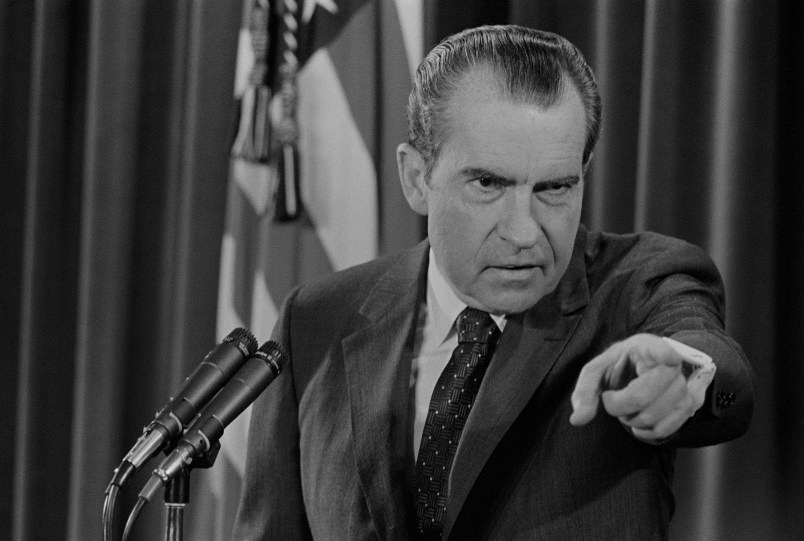This article is part of TPM Cafe, TPM’s home for opinion and news analysis.
It is a popular meme about sex and politics: “Yeah you cute, but are you down with the revolution?” Based on personal experience, and Trump supporters’ apparent dating difficulties, politics literally and figuratively cut to the heart.
During my early 20s — armed with only a passport, mismatched luggage, and a credit card — I boarded a one-way British Airways flight to London. Fed up with American racism, I decided to move to the UK.
I met a Ghanaian man at a discotheque, and he asked me where I was from. Since few people know my tiny, midwestern hometown — Bloomington, Illinois — I gave an easier answer. Over The Prodigy’s “Firestarter,” I shouted, “I’m African American.”
The Ghanaian man laughed.
He then proceeded to ask what language I spoke at home, which holidays I celebrated and where exactly in Africa my parents were from. I felt like a little brown Uncle Sam. The encounter changed my views on ethnicity. I wasn’t African American. I was a Black person who happened to be an American.
Later, I had a similar experience in a different country, with a different man and a different context. Back then, I was working for the State Department at the American Embassy in The Hague. I got the job as part of a fellowship program to recruit new people into the State Department. Aside from the mailroom, there weren’t a lot of Black Americans working at the Embassy on Lange Voorhout Street. I remember exactly three:
- The amazing Ollie Wright
- The guy heading up DEA stuff
- Me
How weird it was to work at an institution representing American interests when the institution itself did not look like America. I’d soon learn underrepresentation of communities of color was a Dutch problem, as well.
As a Black American woman living on the other side of the pond, I was struck by the similarities and differences between Black Americans, Black Brits, and Black Europeans. Hell, even that word “Black” encompasses many ethnicities and nationalities that extend far beyond the U.S., the U.K. and, of course, Africa.
In fact — many years, miles, and an ocean later — after Minneapolis police officer Derek Chauvin killed George Floyd by kneeling on his neck for 8 minutes and 46 seconds, I eventually thought about the cute Ghanaian man I’d met in London. He has almost certainly forgotten about me, but I am sure he heard the news about Floyd. Who hadn’t? Did the Ghanaian man participate in the massive London protest? Such an act would acknowledge a solidarity that he seemed to dismiss when I met him as The Prodigy’s pretty boy frontman Liam Howlett shouted over 90s EDM.
Once the news cycle shifts and stories about George Floyd become less prevalent, here is one lesson I hope we all carry forward: If we are ever to achieve racial justice and equality anywhere, or everywhere, we must collaborate with international allies. In addition to the importance of figuratively — or literally, no judgements — cozying up to those who are down with the revolution, I would posit there are at least five other international lessons we can learn from Floyd’s murder and the protests against police brutality sparked by it.
We must require police accountability. Media can help us accomplish that.
To bring about police accountability, we have to acknowledge the important roles digital media and technology play in documenting and exposing injustice. Globally, everyone knows Derek Chauvin killed George Floyd because we all saw it happen.
We have witnessed the media’s power in earlier times of unrest. As one example, during the American Civil Rights Movement, fellow Black American woman Mamie Elizabeth Till-Mobley bravely proclaimed, “I wanted the world to see what they did to my baby.” See it, the whole world did, when “Jet Magazine” published images of Emmett Till’s body in an open casket.
Documented evidence is often the foundation upon which we ensure transparency. The U.S. must require all security forces to wear body cameras and identifying insignia and badges, protect protestors’ right to film the police and stop targeting journalists.
Domestic protests should be coupled with demands for international policy change
While the Movement for Black Lives, a coalition that includes Black Lives Matter and other groups, has issued a policy platform, it is very U.S.-centric.
In the wake of Floyd’s murder, the U.S. has made progress in several areas. From Baltimore to Los Angeles and many cities in between, municipalities are slashing police budgets and reinvesting in communities. Public transportation authorities are refusing to serve as private escorts for police officers countering peaceful protests. Chokehold bans are either in place, or in consideration, in Utah, Iowa, Minnesota, New Jersey, and elsewhere as communities re-envision rules regarding use of force.
But it does not escape my attention that — when Canadian Prime Minister Justin Trudeau was asked to share his views about Donald Trump’s military response to protests about Floyds murder — after a 22-second pregnant pause, he acknowledged: “There is systemic discrimination in Canada, which means our systems treat Canadians of color, Canadians who are racialized, differently than they do others.”
Much like COVID-19, racism runs across borders. Accordingly, policies that seek to address racial injustices must include global solutions — including, but not limited to, immigration justice and reform.
Recognize the power of the arts
Creative actions of performing artists and politicians in Washington, D.C., are reverberating throughout New York, Cincinnati, Atlanta, St. Petersburg — Florida, not Russia — though similar murals are popping up in cities around the world.
Additionally, Hollywood — arguably one of America’s largest exports — is adjusting programming to acknowledge its role in inhibiting racial justice. As I first argued in an article for The Huffington Post nearly a decade ago, policy, art, and media can collectively build the better worlds we imagine.
I run a pop culture, entertainment, and digital and data analytics firm that helps organizations fundraise and advocate for important causes — including sexual and reproductive health — by incorporating the arts into their arsenal of media and communications tools. Educating funders about the importance of supporting Black-owned and Black-led organizations that use art to expand anti-racist messaging is a good place to start.
National security starts at home
My Black, Indigenous, people of color (BIPOC) colleagues who are U.S. active duty service members and vets are already acutely aware of this. BIPOCs disproportionately work to serve our country overseas. As fellow writer, Lily Burana notes, “In 2016, Black people made up 12.6 percent of the U.S. population, but 21 percent of the Army, 10.3 percent of the Marine Corps, 17 percent of the Navy and 13.5 percent of the Air Force on active duty were all Black.” Further, as Richard Brody astutely states in his review of Da 5 Bloods for The New Yorker, it’s a “daily war at home that’s waged against black Americans, who are forced to fight for survival, equality, and justice.”
BIPOC folks have been doing the work to make the world safer for everyone and are often not guaranteed similar security when they return home. This discrepancy must change.
Embrace the nuance of the fight
As someone who has written about sex — another kind of international affairs — for nearly 15 years, I think it is truly beautiful that, in American English, the word intimacy can either mean “intellectual proximity” or “having sex.” And just like the word intimacy has dual meanings, so too does the word fight.
A fight can be a bad tussle or a struggle to advance social good. Along the journey toward a more equitable world, we must guard against perpetuating injustices or becoming immoral ourselves. Luckily, the #MeToo movement taught us all a master class in holding one another accountable. We would do well to apply those lessons to racial — and other forms of — harassment and abuse. Shame on us when, for the sake of our causes, we silence the victims fighting for social good alongside us simply because the abuse was perpetuated by someone who is Black, a Democrat, or a woman. We cannot be selective about condemning abusive, toxic or unjust behavior.
When we fight, we win. We have already come so far in just one month’s time. Imagine the beautiful change we could create in the world — not just the U.S. — if we continue. Stay in the streets. Stay on the phone with your elected officials. Keep voting. Stay in the fight.
Twanna A. Hines is an award-winning sexual health educator and entrepreneur. Committed to reducing violence and increasing security at home and abroad, she is a member of the Truman National Security Project. She has contributed a book chapter about Dutch immigration, and she is currently writing a memoir about her experiences as a Black American living and working in Europe.










I like the author’s assumption of continued momentum of our struggle after the murder of George Floyd.
It cannot fade. And should not.
Never lose hope.